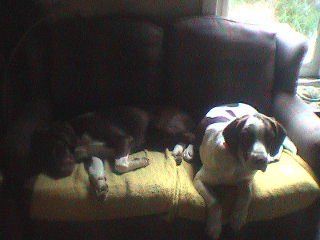There are some things you just wouldn't want to do without living in the country in Kansas.
A lot of rock on your driveway.
A good view of the sunset.
Neighbors with tractors.
Some way to get rid of trash and recycling.
Some friendly outdoor cats.
That last item is there because there are a few things you would really love to do without:
Mice.
Rats.
Pack rats.
Other assorted rodents.
Now, although we were
adopted by a stray cat not too long ago, he is really the skittish, wondering hobo type of cat. Sometimes he's around, sometimes he's not. We'd really like more of a 24/7 rodent patrol. Plus we can't ever get close enough to Sneaky to play with him.
So on Labor Day, I brought home two cats from my parents place: Hudson and Nash. Both are yellow. Neither of them were really accustomed to a car carrier, and though the trip is less than 15 minutes, were quite scared by the end of it.
We normally pen up outside cats for the first few days so that they can identify with a new home, then let them roam free. So we decided to take them in to the grain elevator and let them roam in there for a little while. This is a big old wood structure about 80 years old. It has two stories, and a series of wooden grain bins built into the first floor.
We took the cats, in their carriers, into one of those bins, closed the door, and then let them out. Both were scared, but one of them calmed down quickly, and was soon happily playing with shoelaces, purring loudly, and generally wanting to be held.
The other made a run for it. He couldn't get out the door, but, well, he managed to climb up the wall. Up and out of the grain bin, and another jump or two and he was in the second story of the building -- no doubt finding a lovely cat-sized place to hide.
We eventually closed up the elevator as best we could, and left for the evening.
Tuesday morning, we saw only the smaller cat around. By the afternoon, Terah saw the older cat prowling around in the yard. That's one thing about 80-year-old farm buildings: they can't keep cats in or out. A cat will find a way in, or a way out, if it wants.
By now, they're playing outside and love it. They still like to go inside, and Hudson -- the older cat -- will let me get within about 5 feet of him. Nash tries to not let me get more than 5 feet away, and has climbed most of the way up my jeans using his claws by now.
When we're not outside, we can see them prowling about outside. Sometimes they'll see something -- maybe a cricket or a mouse -- and they'll crouch down, tail moving excitedly, ready to pounce. They don't really play with each other, but they stay close by.
All of this is great, but it comes with a price: I no longer have an excuse to avoid cleaning the rat droppings out of the elevator, because they won't just reappear within a month anymore.
 I've never had a dog of my own since I grew up, but there have always been
dogs in my life.
I've never had a dog of my own since I grew up, but there have always been
dogs in my life.

 I've never had a dog of my own since I grew up, but there have always been
dogs in my life.
I've never had a dog of my own since I grew up, but there have always been
dogs in my life.

 (This was going to be a comment on this blog
post,
but it s a Turdpress site that wants JS and cookies to comment. Bugger that
for a game of skittles.
Rimuhosting s recent extended outage due to power
problems
was apparently caused by a transfer switch failure at their colo
provider. This has led people to
wonder if putting UPSes in individual racks is a wise move. The theory is
that in the event of a small outage, the UPS can keep things humming, and in
an extended outage you can gracefully shut things down rather than having a
hard thump.
I happen to think this theory is bunkum. Your UPS is a newly instituted
single point of failure. I d be willing to bet that the cost of purchasing,
installing, and maintaining the UPSes, as well as the cost of the outages
that inevitably result from their occasional failure, would be far greater
than the cost of the occasional power outage you get in a well-managed
facility.
Good facilities don t have small outages. They don t have squirrels in the
roof cavities, and they don t have people dropping spanners across busbars.
The only outages they have are the big ones, when some piece of
overengineered equipment turns out to be not so overengineered the
multi-hour (or multi-day) ones where your UPS isn t going to stop you from
going down. Your SLA credit and customer goodwill is already toast, so all
you re saving is the incremental cost of a little bit more downtime while
you get fscks run.
If you want the best possible power reliability, get yourself into a really
well engineered facility, and run dual-power on everything. Definitely
run the numbers before you go down the UPS road; I ll bet you find they re
not worth it.
(This was going to be a comment on this blog
post,
but it s a Turdpress site that wants JS and cookies to comment. Bugger that
for a game of skittles.
Rimuhosting s recent extended outage due to power
problems
was apparently caused by a transfer switch failure at their colo
provider. This has led people to
wonder if putting UPSes in individual racks is a wise move. The theory is
that in the event of a small outage, the UPS can keep things humming, and in
an extended outage you can gracefully shut things down rather than having a
hard thump.
I happen to think this theory is bunkum. Your UPS is a newly instituted
single point of failure. I d be willing to bet that the cost of purchasing,
installing, and maintaining the UPSes, as well as the cost of the outages
that inevitably result from their occasional failure, would be far greater
than the cost of the occasional power outage you get in a well-managed
facility.
Good facilities don t have small outages. They don t have squirrels in the
roof cavities, and they don t have people dropping spanners across busbars.
The only outages they have are the big ones, when some piece of
overengineered equipment turns out to be not so overengineered the
multi-hour (or multi-day) ones where your UPS isn t going to stop you from
going down. Your SLA credit and customer goodwill is already toast, so all
you re saving is the incremental cost of a little bit more downtime while
you get fscks run.
If you want the best possible power reliability, get yourself into a really
well engineered facility, and run dual-power on everything. Definitely
run the numbers before you go down the UPS road; I ll bet you find they re
not worth it.
 Spend millions visiting space TWICE, take Amazon referal money from non profit... priceless!
Spend millions visiting space TWICE, take Amazon referal money from non profit... priceless!
 We should not be so cocky. While the technical world is more structured and predictable than other areas, it has its limits too. One can only see so far down into complexity before predictability is lost in the detail. That s where we get so called Heisenbugs . Looking out to the future we can only see so far as well.
Recently I ve been reading The Black Swan. It is a useful reminder that the future isn t as linear and predictable as we d like to pretend it is. One idea that has stuck in my head is the idea that in order to take something into account that one will know in the future in one s predictions, one must already know it. There is an inherent limit to how far we can see.
How is this relevant to distribution developers? Each time we set off to develop a new release, we make an assessment of how to best expend the available resources (our own, our company s, our group of people we can talk into doing stuff) to make things better . We do the best we can, but we must always be mindful of the fact that we press forward using our best engineering judgement, but as we look into the future, eventually this is all just liquor and guessing too.
We should not be so cocky. While the technical world is more structured and predictable than other areas, it has its limits too. One can only see so far down into complexity before predictability is lost in the detail. That s where we get so called Heisenbugs . Looking out to the future we can only see so far as well.
Recently I ve been reading The Black Swan. It is a useful reminder that the future isn t as linear and predictable as we d like to pretend it is. One idea that has stuck in my head is the idea that in order to take something into account that one will know in the future in one s predictions, one must already know it. There is an inherent limit to how far we can see.
How is this relevant to distribution developers? Each time we set off to develop a new release, we make an assessment of how to best expend the available resources (our own, our company s, our group of people we can talk into doing stuff) to make things better . We do the best we can, but we must always be mindful of the fact that we press forward using our best engineering judgement, but as we look into the future, eventually this is all just liquor and guessing too.



